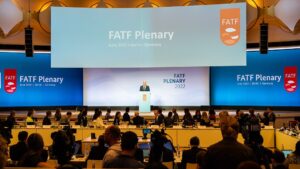
At its plenary meeting on February 21-23 in Paris, the FATF (Financial Action Task Force) once again ignored Ukraine’s call to add Russia to the list of high-risk jurisdictions – the so-called “blacklist”.
The FATF merely recalled its statement condemning Russia’s actions a year ago and added that “members note with concern the potential risks to the international financial system, including Russia’s growing financial ties to countries subject to FATF countermeasures, the risks of financing the proliferation of weapons of mass destruction, and malicious cyber activity and ransomware attacks.”
The organization noted that, given the seriousness of these risks, many FATF members are taking proactive measures to protect themselves and the global financial system, and reiterated its call for all jurisdictions to remain vigilant in relation to the above risks.
“As we have done since the outbreak of Russia’s aggressive war, FATF members will continue to monitor the situation and the risks to the global financial system. As a suspended member of the FATF, the Russian Federation remains responsible for fulfilling its obligations to implement FATF standards,” the updated statement reads.
The Ministry of Finance of Ukraine, for its part, welcomed these expanded comments, but emphasized that they do not comprehensively address the Kremlin’s continued and deliberate disregard for FATF standards and principles since its membership was suspended a year ago.
“The Ministry understands the political problems associated with reaching a consensus on further measures, but the facts show that more needs to be done to counter the threats that Russia poses to the integrity of the global financial system,” the Finance Ministry said in a statement on Friday.
The Ukrainian ministry recalled that last year Russia increased its arms trade with FATF blacklisted states Iran and North Korea, and since December, evidence has continued to emerge that Russia is purchasing North Korean missiles for use on the battlefield against Ukraine, in violation of UN sanctions.
Kyiv believes that at its next plenary meeting, the FATF should adopt tougher restrictive measures to mitigate these serious threats. The Ministry of Finance of Ukraine also called on individual countries not to wait for the FATF’s decision, but to add Russia to their national lists of high-risk jurisdictions, which will require a more thorough examination of all transactions related to Russia and other restrictive measures.
“The FATF, an organization charged with ensuring the safety of the global financial system, must fulfill its mandate. The absence of more stringent restrictive measures dangerously plays into the hands of the Kremlin, giving it and possibly other malicious actors the green light to continue the gradual destruction of the rules-based international structure,” commented Finance Minister Sergii Marchenko on the decision of the plenary session.
The FATF communiqué states that the plenary session chaired by T. Raja Kumar from Singapore was attended by delegates from over 200 jurisdictions. Among the key outcomes is new risk-based guidance on the implementation of Recommendation 25 on beneficial ownership and transparency of legal entities.
The Plenary also agreed to publish for public comment a number of options for potential changes to Recommendation 16 and its Interpretive Note on wire transfers. The proposed amendments are aimed at adapting the FATF standards to changes in payment system business models and messaging standards, as well as at ensuring that they remain technology-neutral.
The organization added Kenya and Namibia to the list of jurisdictions under enhanced scrutiny that are working with the FATF to address strategic deficiencies in their anti-money laundering regimes, while removing Barbados, Gibraltar, Uganda and the UAE from the list due to significant progress.
The plenary agreed to appoint a new FATF president for a two-year term starting in July 2024: Elisa de Anda Madrazo of Mexico, who served as FATF vice president from July 1, 2020, to June 30, 2023, will take over from Elisa de Anda Madrazo.

The FATF (Financial Action Task Force) at its plenary session on October 25-27 in Paris once again ignored Ukraine’s call to include Russia in the list of high-risk jurisdictions – the so-called “black list”.
“The suspension of Russia’s membership remains in force. Following the statements issued since March 2022, the FATF reiterates that all jurisdictions should be vigilant about the ongoing risks associated with circumventing measures taken against the Russian Federation to protect the international financial system,” the final communiqué reiterates the organization’s position on Russia.
The FATF has also updated the “gray” list of countries that are under enhanced monitoring for money laundering and terrorist financing.
The organization removed Albania, Cayman Islands, Jordan and Panama from the gray list and added Bulgaria to it.
The list also includes Barbados, Burkina Faso, Haiti, Gibraltar, the Democratic Republic of the Congo, Yemen, Jamaica, Mali, Mozambique, Nigeria, the United Arab Emirates, Senegal, South Sudan, Syria, Tanzania, Turkey, Uganda, the Philippines and South Africa.
At the same time, the FATF left the blacklist unchanged. It includes countries that require countermeasures, such as the DPRK and Iran, and countries that require enhanced due diligence commensurate with the risks (Myanmar).
Among the main outcomes of the plenary session, the FATF agreed to publish a key report on crowdfunding for terrorist financing. Members also agreed to amend FATF Recommendation 8 to clarify the measures applicable to NPOs. The FATF will also scale up its work on criminalizing terrorist financing in countries (Recommendation 5).
FATF members recognized the need for full and effective implementation of the FATF Standards in all jurisdictions. This includes the analysis and exchange of financial information on terrorist financing networks, as well as the use of financial and law enforcement tools, such as financial sanctions and confiscation, to cut off terrorists from their sources of revenue and weaken the infrastructure that these groups need to achieve their destructive goals. This also includes the designation of identified terrorists and terrorist groups in accordance with relevant UN Security Council resolutions.
In an important milestone, the press release notes, delegates also agreed on a significant set of amendments to the FATF Recommendations that will provide countries with a much more powerful toolkit of measures to deprive criminals of the proceeds of crime. To further improve global asset recovery efforts, the FATF also published a report that sets out recommendations for strengthening the role and use of Asset Recovery and Investigation Networks (ARINs) in investigating transnational money laundering cases.
The FATF also approved reports on illicit financial flows resulting from cyberspace fraud and the misuse of citizenship and residence permits through investment programs, the report said.
Following recent amendments to the beneficial ownership and transparency standards, delegates also agreed to release for public comment an updated risk-based FATF Guidance on Recommendation 25 on beneficial ownership and transparency of legal arrangements.

FATF (Financial Action Task Force) plans to issue detailed instructions in October this or February next year on the implementation of its new recommendations on transparency of beneficial ownership, said the head of the Secretariat’s Risk and Policies Department organization Tom Neylan.
The next FATF plenary meetings are scheduled for October and February.
Speaking at a FATF-sponsored seminar on Thursday, Neylan noted that the organization has begun the practical implementation of its new legal entity transparency standard. In this regard, the discussion participants discussed the best world practices in the field of creating registers of beneficial owners of companies, the need for constant monitoring of the relevance of the information contained in the registers, the importance of interaction in this matter between the private and public sectors.
Emil van der Doos de Villebois, Head of Global Financial Markets at the World Bank, recalled that almost all criminal schemes that the international community is fighting against use legal entities in one way or another.
Michael Levy, a professor at Cardiff University, believes that the FATF, by implementing the new recommendations at the international level, should thereby “ensure a level playing field.” In his opinion, if there is no transparency of companies, then there is a real threat that international business will simply ignore minimally risky partners, because otherwise, in the conditions of a lack of information, they will have to do so many additional checks that the client will simply “become unprofitable” for them.
“Countries are often surprised when they find that the FATF Evaluation Panel starts looking in the public domain for information about permanent or nominee directors during the evaluation. It happens unexpectedly. But we check it,” Neylan said.
Neilan and European Commission Policy Officer Chiara Bakchi agreed on the importance of using public registers. In their opinion, not only the accuracy of the information collected is important, but also the interaction between different national registries. “I’m not talking about real harmonization (of registers – IF), but at least about the relationship, when we can find common information,” Bakci said.
In March, the organization adopted amendments to recommendation 24 (transparency and beneficial owners of legal entities). The amendments oblige countries to prevent the misuse of legal entities for money laundering or terrorist financing by ensuring that adequate, accurate and up-to-date information is available on the beneficial owners of legal entities.
The authors of the amendments insist on the introduction of a multi-vector approach, that is, the use of a combination of various mechanisms for collecting information on beneficial ownership in order to ensure its timely availability to government bodies.
Jurisdictions should apply any additional measures necessary to identify the beneficiaries of companies. These measures should include the storage of information obtained by regulated financial institutions and professionals, regulators or stock exchanges.
The FATF is an intergovernmental body established in 1989 that develops standards and promotes the effective application of measures to combat money laundering, the financing of terrorism and the proliferation of weapons of mass destruction.
The FATF standards include recommendations, as well as explanatory notes to them and definitions. The measures provided for by these standards are mandatory for all members of the organization. The extent to which the relevant measures are implemented in practice is checked through a system of mutual evaluations.